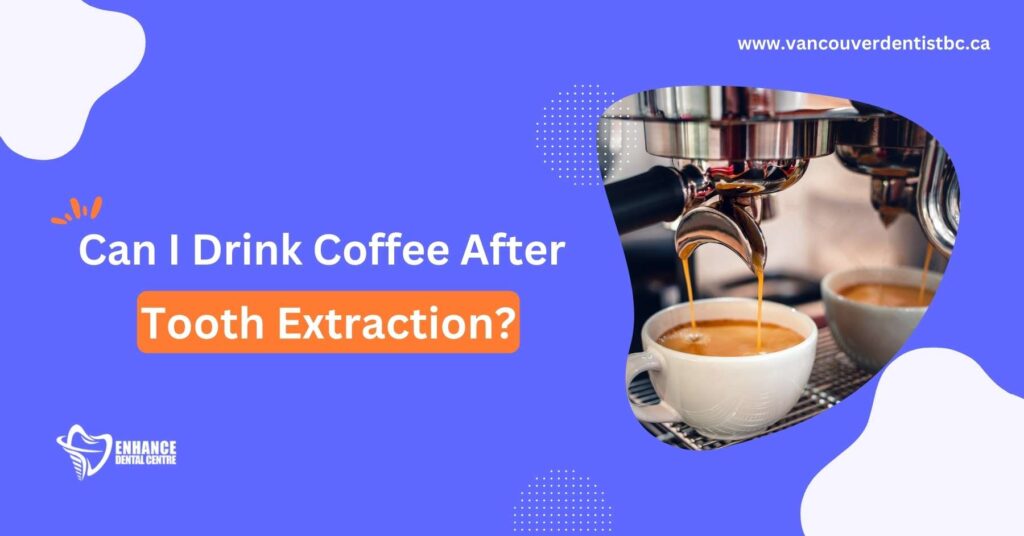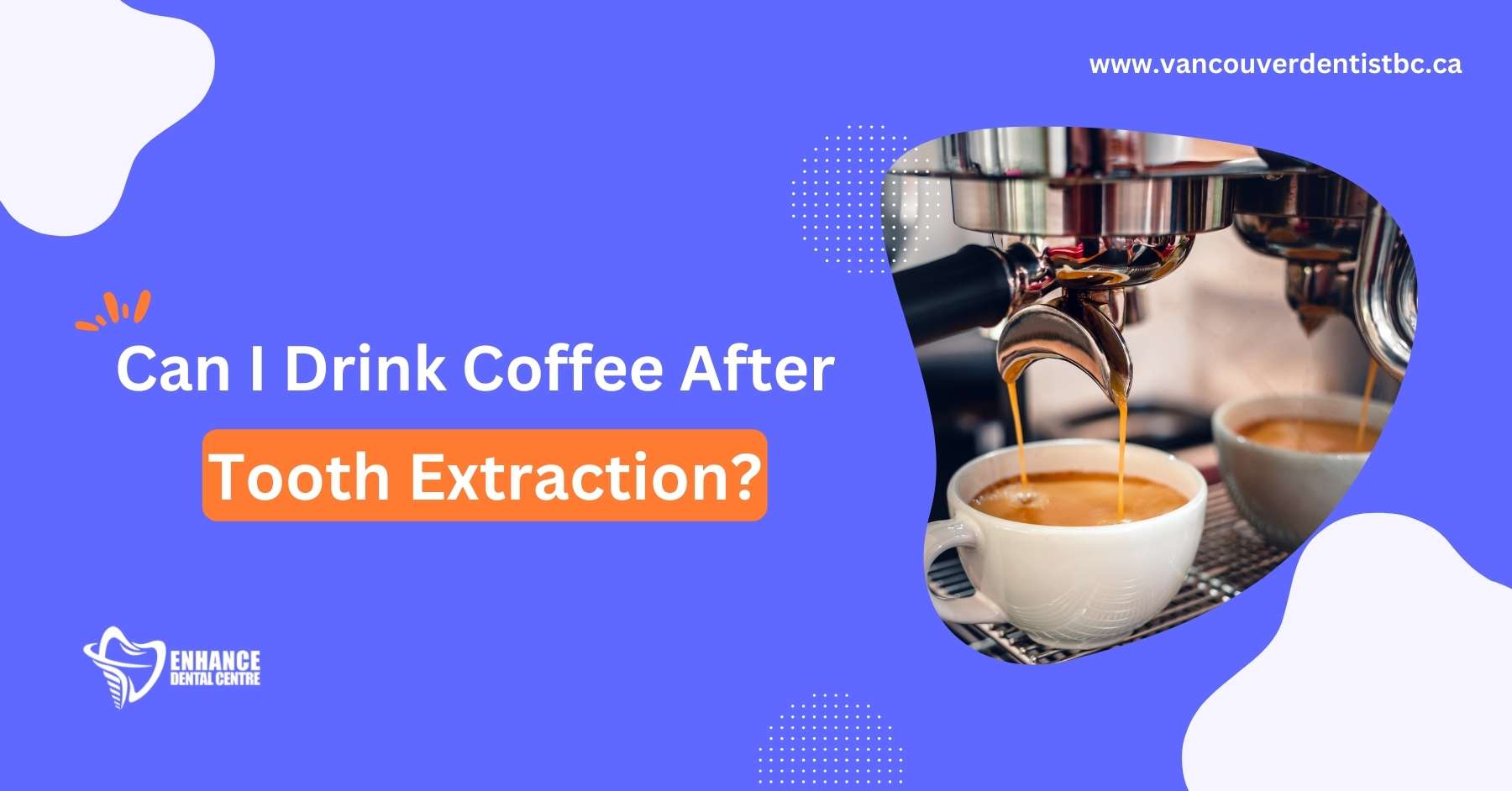
Can You Drink Coffee After Tooth Extraction? A Dentist’s Guide
Undergoing a tooth extraction is a significant event, and the recovery process demands careful attention to ensure proper healing and minimize complications. One of the most common questions patients have after this procedure revolves around dietary restrictions, particularly concerning their favorite beverages. This article, written by a seasoned health journalist, delves into the crucial question: Can you drink coffee after tooth extraction? We’ll explore the potential risks, provide expert recommendations, and offer practical advice to navigate this delicate period.
Understanding the Tooth Extraction Process and Recovery
Before addressing the coffee question directly, it’s essential to understand the mechanics of a tooth extraction and the subsequent healing process. A tooth extraction involves removing a tooth from its socket in the jawbone. This creates an open wound, which, in the initial hours and days, is extremely vulnerable to infection and disruption.
The body initiates a complex healing cascade. A blood clot forms in the socket, acting as a protective barrier and the foundation for new tissue growth. This clot is crucial; dislodging it can lead to a painful condition called dry socket, characterized by intense pain and delayed healing. Therefore, any activity that could interfere with clot formation or stability should be avoided.
The Risks of Drinking Coffee After Tooth Extraction
Coffee, a beloved beverage for many, presents several potential risks to the healing process after a tooth extraction. These risks are primarily related to the composition and effects of coffee on the oral cavity.
- Temperature: Hot beverages like coffee can potentially irritate the extraction site. The heat can also increase blood flow to the area, which may dislodge the blood clot and prolong healing.
- Acidity: Coffee is acidic. Acidic substances can irritate the delicate tissues in the extraction site, potentially slowing down healing and increasing discomfort.
- Caffeine: Caffeine, a stimulant found in coffee, can elevate blood pressure. Increased blood pressure could potentially destabilize the blood clot and increase the risk of bleeding.
- Particles: Coffee contains tiny particles that can become lodged in the extraction site. This can lead to irritation and increase the risk of infection.
- Suction: The act of sipping coffee, especially through a straw, creates suction. This suction can dislodge the blood clot, leading to dry socket.
Considering these factors, the general consensus among dental professionals is that drinking coffee after tooth extraction should be approached with caution, or ideally, avoided entirely for a certain period.
Expert Recommendations: When Can You Drink Coffee After Tooth Extraction?
The timing of when you can safely resume drinking coffee after a tooth extraction is not a one-size-fits-all answer. It depends on several factors, including the complexity of the extraction, the individual’s healing rate, and the dentist’s specific instructions. However, here are some general guidelines:
- First 24 Hours: It’s generally recommended to avoid coffee completely during the first 24 hours after the extraction. This is the critical period when the blood clot is forming and is most vulnerable.
- First 72 Hours: Many dentists advise avoiding coffee for at least 48-72 hours. This allows the initial healing to progress and reduces the risk of complications.
- Beyond 72 Hours: After the initial 72 hours, you might be able to slowly reintroduce coffee, but with significant modifications. Consider drinking it lukewarm, avoiding straws, and rinsing your mouth gently with water after each sip. However, always consult with your dentist.
- Individual Advice: The best course of action is always to follow your dentist’s specific instructions. They will assess your individual situation, including the extraction site and healing progress, and provide tailored advice.
Safe Alternatives to Coffee After Tooth Extraction
While you’re abstaining from coffee, there are plenty of safe and enjoyable alternatives to satisfy your caffeine cravings and keep you hydrated. Here are some suggestions:
- Decaffeinated Coffee: If you are a coffee aficionado, switching to decaffeinated coffee can eliminate some of the risks associated with caffeine while still offering a familiar taste.
- Herbal Teas: Many herbal teas, such as chamomile or peppermint, are soothing and can provide a comforting alternative to coffee. Ensure the tea is lukewarm and does not contain any small particles that could irritate the extraction site.
- Fruit Juices (Diluted): Diluted fruit juices can provide essential vitamins and hydration. Avoid acidic juices like orange or grapefruit.
- Water: Plain water is always the safest and most essential beverage option. It helps keep you hydrated and promotes healing.
- Smoothies (Carefully): Smoothies can provide nutrients, but be cautious of ingredients like seeds or small pieces of fruit that could get lodged in the extraction site.
Tips for Managing Coffee Consumption After a Tooth Extraction
If, after consulting with your dentist, you decide to reintroduce coffee into your diet, here are some tips to minimize the risks:
- Temperature Matters: Drink your coffee lukewarm or at room temperature. Avoid hot coffee, which can irritate the extraction site.
- Avoid Straws: The suction created by straws can dislodge the blood clot. Drink directly from a cup.
- Gentle Rinsing: After drinking coffee, gently rinse your mouth with plain water to remove any coffee particles. Avoid vigorous rinsing or spitting.
- Monitor for Symptoms: Be vigilant for any signs of complications, such as increased pain, bleeding, or swelling. If you experience any of these symptoms, contact your dentist immediately.
- Listen to Your Body: If drinking coffee causes any discomfort, stop immediately and switch to a safer alternative.
The Importance of Following Your Dentist’s Instructions
The information provided in this article is for general guidance only. The most crucial step in ensuring a smooth recovery after a tooth extraction is to follow your dentist’s specific instructions. They understand your individual case and can provide the most accurate and personalized advice.
Your dentist will likely provide you with detailed post-operative instructions, including dietary recommendations, oral hygiene practices, and medication guidelines. Adhering to these instructions is paramount to preventing complications and promoting optimal healing. This includes being mindful about drinking coffee after tooth extraction.
Common Complications and When to Seek Help
While most tooth extractions heal without complications, there are some potential issues to be aware of. Being informed about these issues and knowing when to seek professional help is crucial. Several warning signs indicate that you should contact your dentist:
- Dry Socket: This is a painful condition that occurs when the blood clot dislodges. It’s characterized by intense pain and a foul taste in the mouth.
- Excessive Bleeding: Some bleeding is normal in the first few hours, but prolonged or heavy bleeding warrants a call to your dentist.
- Infection: Signs of infection include increased pain, swelling, fever, and pus.
- Numbness or Tingling: If you experience persistent numbness or tingling in your lip, chin, or tongue, contact your dentist.
- Difficulty Swallowing or Breathing: If you experience any difficulty swallowing or breathing, seek immediate medical attention.
Early intervention is key to addressing any complications and ensuring a successful recovery. Don’t hesitate to contact your dentist if you have any concerns or questions about your healing process, especially regarding drinking coffee after tooth extraction.
Conclusion: Making Informed Choices for a Smooth Recovery
Recovering from a tooth extraction requires patience, care, and adherence to your dentist’s instructions. While the simple pleasure of drinking coffee after tooth extraction may be tempting, it’s essential to weigh the potential risks against the benefits. By understanding the potential complications associated with coffee consumption and following the expert advice provided, you can make informed choices that prioritize your oral health and promote a smooth and comfortable recovery. Remember, your dentist is your best resource for personalized guidance. Prioritize your health and recovery by seeking professional advice and making informed decisions about your diet and lifestyle choices after a tooth extraction.
The decision to consume coffee after a tooth extraction should be made in consultation with your dentist. They can assess your individual situation and provide the best recommendations for your specific needs. Be patient, follow their instructions carefully, and prioritize your oral health for a successful recovery. Following these guidelines will help you navigate the recovery period and minimize the risk of complications, ensuring a healthy and comfortable healing process. Avoiding coffee consumption and other potentially irritating substances like alcohol in the early stages of recovery is crucial.
Remember to prioritize your healing and follow your dentist’s advice. The information provided here should not substitute professional medical advice. Always consult with your dentist for personalized recommendations, especially regarding drinking coffee after tooth extraction.
This guide provided a detailed explanation of whether you can drink coffee after tooth extraction. [See also: Related Article Titles]


